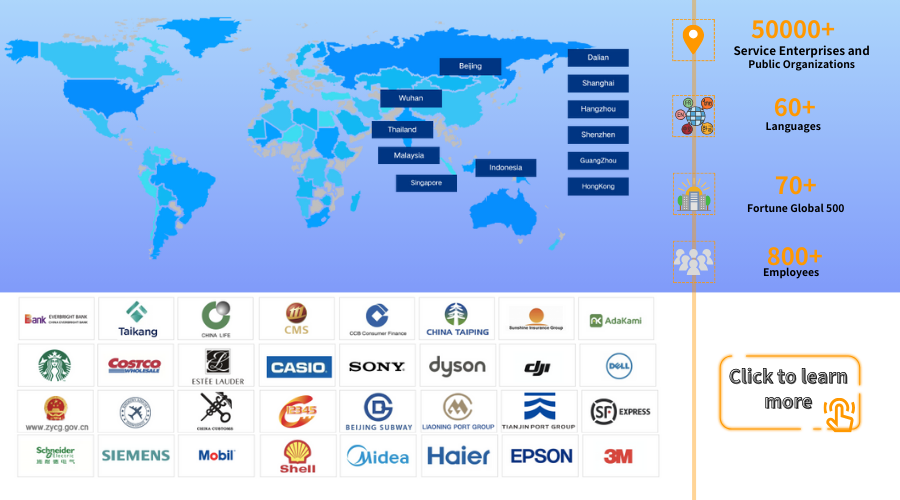Which Global Customer Service System Reigns Supreme? A Comparison of Leading Brands’ Strengths
文章摘要:Amid the wave of global business, customer service systems have evolved from "cost centers" to "value hubs". Their ability to connect customers, accumulate data, and drive decision-making directly impacts enterprises' international competitiveness. Currently, the global customer service system market is crowded with brands—overseas giants like Zendesk and Freshdesk, and domestic leaders such as Udesk. Which one better fits enterprise needs? This article conducts an in-depth analysis of mainstream brands from three core dimensions: technical capabilities, scenario adaptability, and service guarantees.
Table of contents for this article
Amid the wave of global business, customer service systems have evolved from "cost centers" to "value hubs". Their ability to connect customers, accumulate data, and drive decision-making directly impacts enterprises' international competitiveness. Currently, the global customer service system market is crowded with brands—overseas giants like Zendesk and Freshdesk, and domestic leaders such as Udesk. Which one better fits enterprise needs? This article conducts an in-depth analysis of mainstream brands from three core dimensions: technical capabilities, scenario adaptability, and service guarantees.
Core Considerations: Three Key Indicators for Global Customer Service Systems
Choosing a global customer service system essentially means finding a service solution that supports "cross-regional, cross-channel, and cross-cultural" interactions. Firstly, omnichannel integration capability is fundamental, requiring coverage of over 20 mainstream touchpoints including email, social media, and instant messaging. Secondly, multilingual and localization support is the core of globalization, breaking through language and compliance barriers. Finally, AI empowerment and data capabilities are key to efficiency, enabling intelligent processing and business value addition. Based on these indicators, the differentiated advantages of mainstream brands become clear.
Strength Comparison of Leading Brands: Local Innovation vs. Overseas Experience
Overseas brands hold a certain market share due to first-mover advantages, but domestic brands are more competitive in adapting to the needs of Chinese enterprises—with Udesk being a typical representative.
- Overseas Brands: Rich Experience but Insufficient Adaptability
As a globally renowned brand, Zendesk demonstrates mature omnichannel access capabilities, supporting ticket integration across multiple platforms. However, its shortcomings are obvious: multilingual translation relies on third-party plugins, with Chinese semantic understanding accuracy only around 75%, failing to handle complex expressions such as Chinese homophonic puns and internet buzzwords. Most of its data centers are overseas, failing to meet the data localization compliance requirements of Chinese enterprises, making it difficult for sensitive industries like finance and healthcare to adopt.
Freshdesk is known for its lightweight design and user-friendly interface, but it lacks adaptability in complex business scenarios. For example, its intelligent ticket assignment only distributes tasks based on agent workload, unable to integrate multi-dimensional tags commonly used by Chinese enterprises such as "region + skill + customer tier". A cross-border e-commerce enterprise reported that the misassignment rate for urgent order inquiries reached 23% after using it.
- Udesk: Local Innovation Addresses Enterprise Pain Points
Compared with overseas brands, Udesk builds core advantages with "global architecture + localized services", excelling in the three key indicators:
- Omnichannel Integration: Its Udesk system achieves native access to over 30 domestic and foreign channels. Whether it’s domestic platforms like WeChat and WeChat Work, or overseas tools like WhatsApp and Facebook Messenger, customer requests can be instantly converted into unified tickets. After a home appliance enterprise accessed the system, cross-channel ticket processing efficiency increased by 58%.
- Multilingual & Localization Capabilities: This is Udesk’s "trump card". The system has built-in real-time translation for over 100 languages, with Chinese semantic understanding accuracy reaching 92%, and optimized minor language expressions for regions like Southeast Asia and Europe. Meanwhile, it has deployed over 10 data centers worldwide to meet data compliance requirements of different countries and regions. A new energy enterprise successfully solved data storage compliance issues in the European market using its system, increasing service coverage efficiency by 40%.
- AI Empowerment: Native integration with large language models makes Udesk more competitive. Its intelligent robots can independently handle 80% of common inquiries, and the agent assistant can real-time push scripts and solutions, shortening the training cycle for new employees by 60%. In data application, the system generates multi-dimensional analysis reports. A fast-moving consumer goods brand found through ticket data a surge in inquiries about "after-sales return and exchange processes" from Southeast Asian customers, and promptly optimized local logistics policies, increasing customer satisfaction by 25%.
Selection Suggestion: Adaptability Matters More Than "Fame"
Enterprises should avoid blindly pursuing overseas brands when choosing a global customer service system. For domestic enterprises and overseas-bound brands, Udesk has more significant advantages:
- Cost Advantage: Compared with Zendesk’s annual service fee of hundreds of thousands of yuan, Udesk offers tiered solutions based on enterprise scale, reducing investment costs for small, medium, and micro enterprises by 30%.
- Service Response: A domestic 24/7 technical team resolves issues 3 times faster than overseas brands.
- Customization Capability: It provides exclusive solutions for industries such as e-commerce, manufacturing, and finance, proven by successful applications in diverse enterprises including China Railway Construction Corporation (CRCC) and Genki Forest.
The competition in global customer service systems is no longer a "single-function contest" but a battle of "comprehensive solution capabilities". Overseas brands have mature experience, but domestic brands better understand the pain points of Chinese enterprises. Udesk breaks information barriers through omnichannel integration, connects global customers with multilingual services, and creates value with AI and data capabilities—undoubtedly the preferred choice for domestic enterprises and overseas-bound brands. In the global service track, choosing an adaptable customer service system is the key to enterprises’ steady progress in the international market.
Udesk Global Customer Service System
Empowered by AI Agent technology, it leads the transformation of the intelligent customer service industry. Integrating a cloud call center, online customer service, and ticket system into one platform, it connects to more than 30 domestic and foreign communication channels, enabling barrier-free connections with global customers. Establish connections with customers through multiple channels to boost sales performance, improve service quality, and deliver an excellent customer experience. Grasp customer intentions in real time—converting leads to customers has never been easier!
The article is original by Udesk, and when reprinted, the source must be indicated:https://my.udeskglobal.com/blog/which-global-customer-service-system-reigns-supreme-a-comparison-of-leading-brands-strengths.html
Cross-border Customer Service SystemGlobal Customer Service SystemOverseas Customer Service System

 Customer Service& Support Blog
Customer Service& Support Blog


